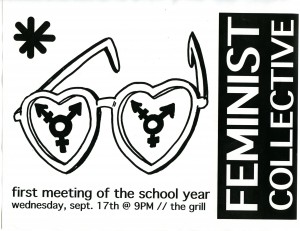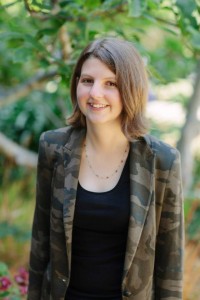Tags
Related Posts
Share This
Collective Ambition
The Feminist Collective held its first weekly meeting Sept. 17 at The Grill. Among the items discussed, besides a new meeting place, was how the less than 10 members in attendance could make a definite and positive impact on campus policy this year.
The feminist collective wants to “create a safer environment for women, and, also, for everybody,” says President Maria Siino.
Siino, a 19-year-old sophomore, and former Collective vice president, has succeeded SFUAD alum and Collective founder Julia Griffin as the club’s top administrator.
Griffin, who now lives and works in Humboldt County, Calif., says of Siino, “Maria is a lot of intensity in a very small package…I know she has the fortitude, the sense of humor and the imagination to run this group…I trust her to pick the right future for the Collective.”
Siino, in her new role, views herself as a facilitator in service to the needs of the Collective, its members and the student population.
“I hold a lot of the responsibility, but I try not to maintain all the power,” Siino says. Her leadership style is meant to cultivate an inclusive atmosphere, and to ensure that lack of official position, or the holding of a position lower in the hierarchy, does not preclude any potentially valuable contributions.
“We want to make sure that no one’s voice goes unheard,” Siino says.
Among those voices is sophomore studio arts major Shelby Criswell, know on Facebook as Buncle Shelborp.
“I joined the Collective because there is a big need to redefine the word ‘feminism’ and show people it’s not a dirty word,” Criswell says. “To me, feminism encompasses so much more than the struggle of women. It’s the fight for equality of everyone…it’s the advocacy of justice for survivors of rape, abuse, and shaming.”
There is no official membership process in the Collective, and anyone is invited to attend meetings, participate in Collective sponsored events, join the Facebook group and post on the Tumblr page.
“We try to keep what we’re doing open and available to everybody, so anyone who wants to come to any event can do so,” Siino says.
Though Collective events for this year have yet to be determined, Siino does plan to work in collaboration with SAFER—Students Active for Ending Rape. SAFER, according to its website, is a nationwide volunteer collective, created in 2000 by students of Columbia University, that believes “strong college sexual assault policies are a key element in the prevention of sexual assault,” and essential to the implementation of such policies are student involvement and leadership.
SAFER members guide students and administration through comprehensive policy reviews, make recommendations based on those findings and provide resources to make the necessary changes.
“Changing the sexual assault policy benefits everyone because anyone can be a victim of sexual assault,” Siino says.
Indeed, a report released last April by the White House Task Force to Protect Students from Sexual Assault revealed, among other findings, that 1-in-71 men, along with 1-in-5 women, “have been raped in their lifetimes.”
While Siino’s efforts will be primarily focused on “improving the sexual assault policy,” she also plans to advocate for more comprehensive RA training and broader student outreach. Siino doesn’t think RAs are “inherently ill-equipped,” but that incidences of sexual assault are very complex and delicate situations to be handled with care, and she wants to “make sure [RAs] know how to handle them properly.”
Finally, because of the previous year’s success, the Collective, according to Siino, may host another Take Back the Night event. TBTNs, created by European women’s collectives in the 1960s, are now held globally, and are designed to raise public awareness of sexual assault and rape, according to the organization’s website.
Last year’s Take Back the Night included pamphleteering, free books provided by Fogelson Library on feminist theory and a keynote speaker.
“Other people in the collective, like Ronnie Garcia, Morgan Czeropski and Eleanora Meyer also make the Collective what it is,” says Griffin, “they are people with the laser eyes required to cut through the bullshit that comes with feminism, and activism in general.”
The future of the Collective seems assured.
“I care about feminism,” Siino says, and the Collective’s potential is summed up by Criswell—“The Collective, I believe, will help to create a safe place to bring up conversations that need to be talked about, help advocate for any change that is necessary and show everyone that feminism is not a dirty word, but is essential.”








 Jackalope Magazine is the student magazine of Santa Fe University of Art and Design. Building on the interdisciplinary nature of our education, we aim to showcase the talent of our university and character of our city.
Jackalope Magazine is the student magazine of Santa Fe University of Art and Design. Building on the interdisciplinary nature of our education, we aim to showcase the talent of our university and character of our city.
Glad to read the article about the organization! Having safe places to bring up conversations and a collective to take action are needed to empower everyone.